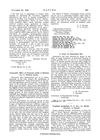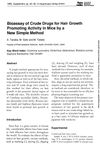 1 citations,
October 1935 in “Nature”
1 citations,
October 1935 in “Nature” Potassium iodide prevents hair loss and reduces toxicity from thallium acetate.
 16 citations,
January 1980 in “Planta Medica”
16 citations,
January 1980 in “Planta Medica” Some natural extracts and one hair tonic can promote hair growth in mice.
 1 citations,
April 2022 in “The Egyptian Journal of Hospital Medicine ”
1 citations,
April 2022 in “The Egyptian Journal of Hospital Medicine ” Fractional laser therapy may help regrow hair in alopecia areata.
 24 citations,
January 2008 in “KARGER eBooks”
24 citations,
January 2008 in “KARGER eBooks” The document concludes that ongoing research using animal models is crucial for better understanding and treating Alopecia Areata.
 18 citations,
June 1988 in “Culture, medicine and psychiatry”
18 citations,
June 1988 in “Culture, medicine and psychiatry” The perception of excessive hair growth in women as abnormal is more influenced by cultural norms than by medical reasons.
 7 citations,
May 2012 in “Actas Dermo-Sifiliográficas”
7 citations,
May 2012 in “Actas Dermo-Sifiliográficas” Scalp fungus infections in Spain are a health concern, with changing causes and a need for better treatment and prevention.
 2 citations,
January 1908 in “Journal of the American Medical Association”
2 citations,
January 1908 in “Journal of the American Medical Association” Fear of hair-related issues causes significant mental distress, especially in high-stress women.
 1 citations,
March 1954 in “Archives of dermatology”
1 citations,
March 1954 in “Archives of dermatology” Animal research has greatly advanced dermatology.
 November 2022 in “SAS journal of medicine”
November 2022 in “SAS journal of medicine” There's no link between low iron levels and the hair loss condition, alopecia areata.
 15 citations,
January 2020 in “Experimental Dermatology”
15 citations,
January 2020 in “Experimental Dermatology” The document concludes that understanding and treatments for alopecia areata have significantly advanced, now recognizing it as an autoimmune disorder.
7 citations,
December 2021 in “Pharmaceutics” The nanoemulsion with garlic oil, apple cider vinegar, and minoxidil could effectively treat alopecia areata.
 April 2024 in “Skin appendage disorders”
April 2024 in “Skin appendage disorders” Environmental pollutants can damage hair health and cause hair loss.
 119 citations,
June 1993 in “BMJ”
119 citations,
June 1993 in “BMJ” Alopecia is a key indicator of thallium poisoning.
 January 2024 in “Current research in toxicology”
January 2024 in “Current research in toxicology” Thallium is highly toxic, causing severe health issues, and Prussian blue is the best antidote.
 37 citations,
January 1997 in “Clinics in Dermatology”
37 citations,
January 1997 in “Clinics in Dermatology” Hair problems are common and distressing for women, but increasing knowledge of treatments offers hope.
 36 citations,
January 2010 in “Human & experimental toxicology”
36 citations,
January 2010 in “Human & experimental toxicology” Eating paradise nuts led to selenium poisoning, causing nausea, hair loss, and other symptoms in two women.
 6 citations,
October 2012 in “BMJ”
6 citations,
October 2012 in “BMJ” The woman's hair loss was mainly due to stress and low iron levels, and her hair grew back after treatment.
 98 citations,
October 2012 in “Dermatologic Clinics”
98 citations,
October 2012 in “Dermatologic Clinics” Eating the right nutrients can improve hair health, but taking extra supplements usually doesn't help unless you have a deficiency.
 96 citations,
September 2017 in “Analytica Chimica Acta”
96 citations,
September 2017 in “Analytica Chimica Acta” Hair elemental analysis could be useful for health and exposure assessment but requires more standardization and research.
 85 citations,
April 2007 in “Dermatologic Clinics”
85 citations,
April 2007 in “Dermatologic Clinics” Some drugs can cause hair loss, change hair color and shape, or increase hair growth, and treatment may involve stopping the drug or using specific hair growth treatments.
 83 citations,
May 1999 in “International Journal of Dermatology”
83 citations,
May 1999 in “International Journal of Dermatology” Hair loss that spreads out can often fix itself or be treated by finding and handling the cause.
 74 citations,
July 1979 in “Lancet”
74 citations,
July 1979 in “Lancet” Biotin treatment can significantly improve hair loss and motor functions in certain metabolic disorders.
 48 citations,
May 2008 in “Drug Discovery Today: Disease Mechanisms”
48 citations,
May 2008 in “Drug Discovery Today: Disease Mechanisms” Hair follicles offer promising targets for delivering drugs to treat hair and skin conditions.
 45 citations,
March 2010 in “Journal der Deutschen Dermatologischen Gesellschaft”
45 citations,
March 2010 in “Journal der Deutschen Dermatologischen Gesellschaft” A systematic approach is crucial for managing hair loss in women.
 41 citations,
July 2015 in “Current Drug Discovery Technologies”
41 citations,
July 2015 in “Current Drug Discovery Technologies” Some plants may help with hair growth and have fewer side effects than synthetic drugs, but more research is needed to confirm their effectiveness.
 40 citations,
July 2017 in “Frontiers in Medicine”
40 citations,
July 2017 in “Frontiers in Medicine” Early and personalized treatment for hair loss in young people is crucial to prevent permanent damage and should include psychological support.
 40 citations,
August 2006 in “Current Drug Safety”
40 citations,
August 2006 in “Current Drug Safety” Some drugs can cause hair loss, excessive growth, or color changes, often reversible but sometimes permanent.
 13 citations,
July 2004 in “Skinmed”
13 citations,
July 2004 in “Skinmed” Common types of non-scarring hair loss have various causes and treatments, but more effective solutions are needed.
 12 citations,
May 1989 in “Postgraduate Medicine”
12 citations,
May 1989 in “Postgraduate Medicine” The document concludes that hair loss is common and can be treated with medications like minoxidil or surgical options, and it significantly affects people's psychological well-being.
 9 citations,
April 1986 in “Postgraduate Medicine”
9 citations,
April 1986 in “Postgraduate Medicine” Hair loss has many causes and treatments, and losing some hair daily is normal; proper diagnosis is key, and minoxidil can help treat it.





























